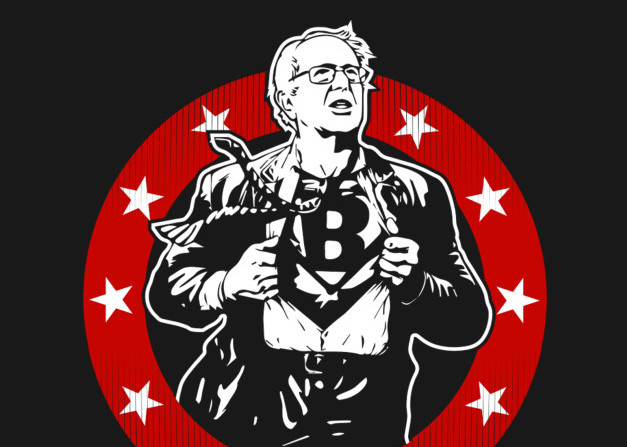Image: teemup
In a previous article, we examined how Seth Ackerman’s proposed organization merely reduces to the tired practice of supporting “progressive” Democrats in electoral primaries, and how it falls short of a force to genuinely advance working class interests. In this piece, we move from the abstract to the concrete, arguing that the Bernie Sanders campaign was an example of putting Ackerman’s politics into practice, and showcases how support for such campaigns leaves workers powerless and disoriented. We use the left wing of the Democratic Socialists of America (DSA) as the foil for much of our critique.
The DSA is a big-tent social-democratic political organization in the United States. We submit that Ackerman’s basic orientation is echoed in a recent statement released by left-wing members within DSA:
We reject the realignment strategy that has guided much of the left’s electoral orientation for decades. We do not, however, call for an immediate and total break from voting for or supporting any Democratic candidate. We all fervently supported Bernie Sanders in the presidential primary, and recognize that he probably would have been a footnote to the campaign if he tried to run as an independent. Voting for Democratic candidates in specific state and local races can be justified in many circumstances.
But if we want to move beyond the cycle of mobilization and retreat that dominates left electoral activity in the US, we have no choice but to build our own political formations and do what all parties do – run candidates for office, particularly in states and localities where competition between Democrats and Republicans is low. Considering the many institutional barriers to effective independent politics, they will also have to launch fights to change ballot access laws and other measures aimed at maintaining the two-party duopoly.
The DSA members’ stance is not far afield from DSA’s official position on elections: “[W]e will continue to support progressives who have a real chance at winning elections, which usually means left-wing Democrats.” The major difference between the two similar approaches seems to be the call to “build our own political formations.” That is, political formations of the kind Ackerman advocates that are independent of the Democratic Party.
But the DSA members’ statement is riven with the same contradictions as Ackerman’s strategy. After defiantly rejecting the Democratic Party politics-as-usual, they declare in the next sentence it might not be so bad after all. They explicitly state voting for Democrats in “specific state and local races” might be permissible, but also mention they all “fervently supported” the Bernie Sanders campaign, notably in neither a state nor local race. It seems that as voters increasingly reject the Democratic establishment, the declared urgency of working within the Party becomes all the more imperative!
The DSA members’ statement is perhaps mistaken in another way — it was precisely Bernie’s refusal to chart an independent political strategy that thwarted any chances he might have had of winning the presidency. Sanders lost to Clinton in the Democratic primary, and at that point endorsed Clinton in the general election as he had previously agreed. Had he taken an alternate course and run as an independent after participating in the Democratic primary, given he had mobilized considerable national support and resources for his platform, he could have overcome the existing obstacles to third party campaign in all but, perhaps, a handful of states. Is it so difficult to believe that Sanders, the most popular politician in the U.S., would have beat out Trump and “Crooked Hillary,” the two least popular presidential candidates in history, in a contest among the general electorate? Because Bernie is more dedicated to keeping his promises to the Democratic Party than he is to attaining meaningful power, we will never know how this counterfactual would have unfolded.
Despite pretenses to the contrary, Sanders is firmly embedded inside the Democratic Party machine and his relationship to the Democrats explains why his campaign seemingly failed to ever consider such an audacious move. It is an object lesson in how association with the Democratic Party necessarily narrows one’s political horizons and circumscribes one’s strategic acumen.
True to form, Sanders squandered the opportunity to channel his support into a force for working class politics by enthusiastically accepting the offer to be in charge of rebuilding the Democratic Party. Bernie’s choices vindicate those who accused him of being a “sheepdog” during the election, but his post-election behavior underscores the following lesson: once one is inside the Democratic Party, the sheepdogging never really ends. The “Our Revolution” NGO seems like it will turn out to be yet another Democratic Party-aligned body, and much of its erstwhile leadership defected for precisely this reason.
The fear of being a “spoiler” crippled Bernie’s strategy (or, it would have, if he had the integrity to withhold his promise to support the Democratic Party), as it has so many progressive thrusts in the past (e.g. the Labor Party, as Ackerman shows). Until the spoiler hangup is dispelled, it will be a stick the Democrats will wield to cow anyone who threatens to run to their left, and the loyal opposition will be given no choice but capitulation on each occasion.
Fortunately, there is a way out of this mess of Democrats having a de facto veto over all left electoral efforts — a principled position of being pro-spoiler. Indeed, socialists should aim not simply to spoil the Democrats’ electoral chances, but to destroy the Democrats as a political force and, more pointedly, defeat the bourgeois class that the Democratic Party represents.
But as the past several elections have shown, the Democrats have proven quite capable of defeating themselves. Their uninspiring overtures have left them in a position of historic weakness, controlling no branches of national government and only a handful of state governments. The recognition that the neoliberal ideology the Democrats have championed is profoundly resented by the public is causing even some party stalwarts to lose faith. And the underlying economics of neoliberalism mean workers will only gain at the expense of capitalists — and, what is profoundly significant, much of the country now seems to understand that the Democratic Party will always side with the latter.
At this time, it is imperative that socialists encourage mass defection from the Democratic Party, not embark on a misguided mission to reconstitute it on a more progressive basis. Those fleeing the hollowed-out shell of the Democratic Party have recognized, or at least have a nagging intuition about, the limits of what electoral politics can win for the working class. This is an unquestionably positive development, and perpetuating the mythology that the Democrats operate as any kind of effective obstacle to the right will obscure the essential class fracture that divides society.
Moreover, it is impossible for there to be a Corbyn-like insurgency within the Democratic Party, for reasons that Ackerman makes clear: the Democratic Party is not an organization with a meaningful membership, much less a membership that controls the decisions of the leaders democratically. Those that mark D on an election ballot have no opportunity to determine the program or leadership of the party. Those decisions are made by a network of party donors, think tanks, and bureaucratic officials, none of whom champion workers’ interests in the slightest. Organizationally, the Democrats are very much a party, and one that consistently promotes capitalist politics. The most effective way for Democrats to maintain control over voters is to continue to accommodate ineffectual ‘progressive’ initiatives and caucuses that disavow the actual means to threaten the central managers, which is abandoning the party. The possibility that the doyens who hold the Democratic Party firmly in their grip would turn its future over to an insurgent left-wing current within the party is unthinkable.
We do not take responsibility that a lesser evil should win elections, and neither should socialists generally. The working class has no obligation to attempt to use the Democratic Party as a defense against the right, and its struggle will be stronger without this impediment. Fearing for the defeat of Democrats only demoralizes the social movements, strikes, and civil disobedience that can actually force the state to reckon with the power of the workers and oppressed. Giving the Democrats support, even through outsider campaigns, has only ever given the capitalists confidence to move further to the right. Withdrawing support from the Democrats is more likely to cause them to adopt reforms in a desperate attempt to regain their influence over the working class. And continuing to oppose the Democrats, with improved organizational tools, will maximize the kind of threat they can understand. The capitalists are responsible for what the Democratic Party does and they can nominate reform candidates whenever they choose who would win large majorities, given the progressive sympathies of the electorate.
If the capitalists cannot preserve the legitimacy of either of their parties in their established forms, that is a punishment that is more than deserved. Socialists can either stand alongside workers who have rejected collaboration with capitalist parties, or else they will find themselves to the right of the masses.










